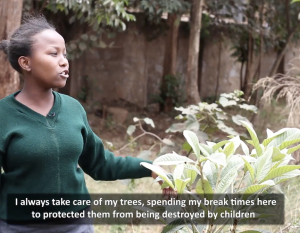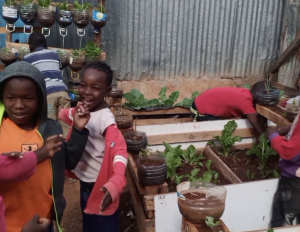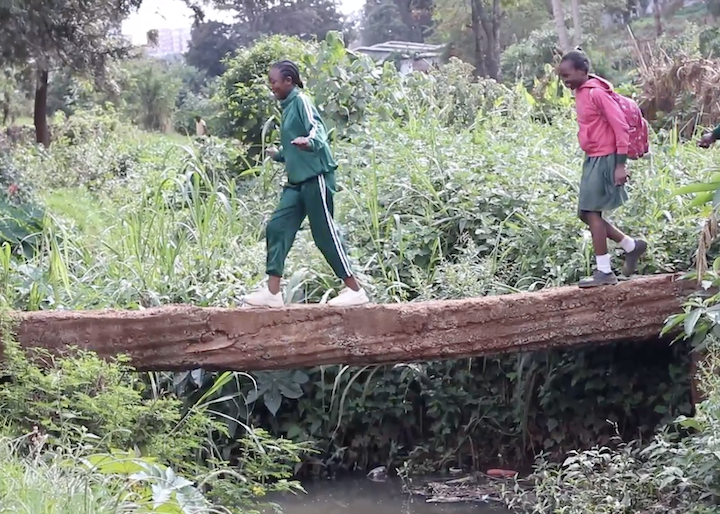by Ariel Miller, ESRAG Newsletter Editor
The Lavington Eco Rotary Club is teaming up with the residents of an impoverished urban neighborhood to fight the scourge of water pollution in the river they depend on. This powerful video illustrates the situation this community faces, their outrage, and how Lavington Eco is teaming up with children and adults to restore clean water and verdant riverbanks in the informal settlement of Kawangware in Nairobi, where most people live on less than US $1 a day, and an estimated 65% of the residents are children and youth who are struggling to carry out their lives surrounded by untreated sewage, urban trash, and industrial waste. Together, they are committed to saving a river in Nairobi.

A fiercely devoted tree protector in Kawangware
The video explains the bleak social and economic conditions exacerbated by the horrible environmental conditions that reinforce this community’s experience of neglect and disregard. Through community consultations, residents and the Club worked together to choose actions they could implement, including river clean-up, waste audits to identify types and sources of pollution, and tree planting. Schoolchildren are learning how to restore and protect a healthy ecosystem and clean water. The video shows the determination and ardor of one little girl who uses her break time to nurture and defend the tree she planted.
This initiative is a pilot project of the Adopt-a-River partnership between Rotary and the UN Environment Programme (UNEP). Lavington Eco’s achievements led to its project winning an award at District Conference and being showcased in a celebratory site visit by UN Deputy Secretary-General Amina Mohammed in 2022.
Lavington Eco Club is now raising funds to scale up the project in partnership with the Kawangware community. Phase II goals include improving communal sanitation infrastructure, adding waste management facilities, teaching students eco-literacy and environmental responsibility, greening the riverbank, and helping youth groups launch water recycling as a source of income.

Children gardening in Kawangware
“It would be great if we can get an international club to partner with on the eco-literacy (behaviour change) aspects of the Adopt-a-river project as the impact is visible, and it benefits communities (particularly children and young people) living in informal settlements and urban slums in Nairobi: greening the ghettos,” says Rotarian Jane Maonga, who is coordinating the Club’s Phase II Adopt-a-River work. You can email her to learn more about the project.
Rotarian Salvador Rico of California shared another video this summer of a river in Hawai’i illustrating the goal of Adopt-a-River: clean water and healthy watersheds from source to sea.
“The rivers are the arteries of the planet: we need to protect them,” he writes. Healthy rivers mean healthy ecosystems. A healthy river provides life to the areas around it, from forests and aquifers on land to the marine life where the river enters the ocean.
“The Hanakäpï’ Ai Stream is an example of how all rivers begin their journey pristine in the mountains, and should end their journey in the ocean just as they began, with clean water,” he explains. “Rotarians can make a positive change in their communities by equipping them to adopt their rivers, lakes, and watersheds, to help restore them to their natural state. Clean water brings a multitude of benefits to our communities and the world. This is the true inheritance, the legacy that we will leave to our future generations. Join us and register your Rotary Club and District in the Adopt a River Program.
